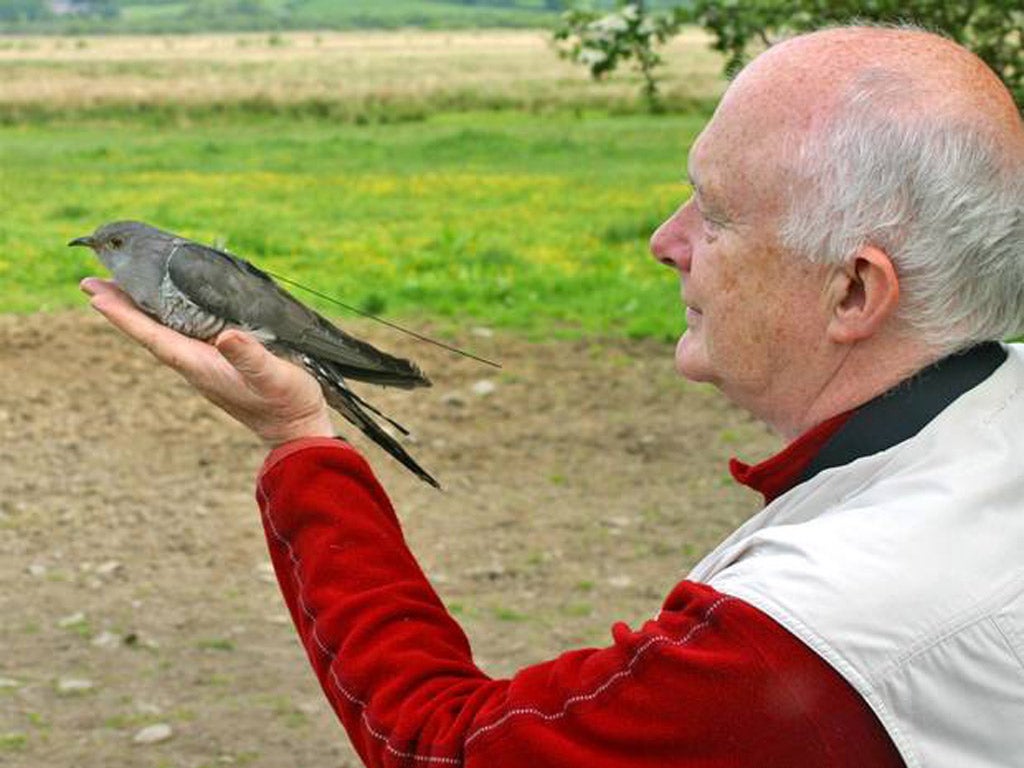An odyssey of 3,400 miles, from Wales to Cameroon, and our brave cuckoo runs out of luck
Of the 13 birds being tracked on their incredible migratory journey, six, maybe seven, have succumbed to the dangers of their journey

Indy, The Independent’s sponsored cuckoo being tracked by the British Trust for Ornithology on migration to his African wintering grounds, hasn’t made it. His satellite tag last transmitted four weeks ago, and BTO scientists now presume he is dead.
He’d nearly made it though, if his destination, as seems likely, was the Congo basin, where all five British cuckoos tracked to Africa last year spent the winter months.
Indy had got as far as northern Cameroon, 3,400 miles from central Wales where he was caught and fitted with his miniature transmitter on 30 May 30; he was on the last stage of his epic voyage when he met his end, perhaps to a bird of prey, perhaps to a human hunter.
It seems unlikely he ran out of food, even though he died in the Sahel, the semi-arid zone south of the Sahara, as his last known location was near a small Cameroonian national park, Mozogo-Gokoro, where there is forest and a river, which is quite likely to be a good refuelling spot for migratory birds.
He'd done the hard part
Having held him in my hands before sending him on his way, I feel all the sorrier, not least because he’d done what we might suppose to be the difficult bits of the journey – crossing the Mediterranean and crossing the Sahara – in fact, he’d done the first of these twice.
For in late July, as we reported, Indy flew in one go from northern Italy almost to Africa, but about-turned over the sea when only 100 miles from the Libyan coast, and flew all the way back to the valley of the River Po in a 1700-mile round trip to nowhere, which astounded the BTO researchers.
It was likely that he felt his strength failing while still not in sight of land, and obeyed a simple evolutionary rule for such an eventuality: “Go back to last good feeding place.” But it’s clearly a rule that works, for after more than three weeks fattening up again, Indy set out for Africa once more, and got there this time, and completed his 1,500-mile Sahara crossing, via Tunisia, Algeria and Niger, on August 24. That’s one intrepid cuckoo.
It might have seemed all plain sailing from then on, but alas, it wasn’t – as it wasn’t for a large proportion of the cuckoos that the BTO is tracking this year. Of the 13 birds being followed, five from Scotland, four from Wales and four from England, six and possibly seven have already succumbed to the dangers of their incredible journeys.
The Scottish-caught birds are doing best, with three now in Central Africa – Roy in the Democratic Republic of the Congo (DRC), Chance in Cameroon, and BB in Chad. But Mungo went silent near Lake Chad in August, while Wallace has not been heard of since mid-September, although it’s possible his tag has failed.
Of the Welsh birds, Indy has been joined as a casualty by Iolo, who died in Chad in late August, but the other two, David and Lloyd, are still transmitting, from the DRC and South Sudan.
English wings
The English birds, all caught in Norfolk, have fared worst: Reacher died in southern Spain on July 26, John died in south-west France in mid-August, and Lyster, who was tracked to Africa and back last season, met his end in Mauritania on August 6. The sole surviving English bird, Chris, who was also tracked to Africa last year, has made it again to the Congo, and is currently about 35 miles from where he spent last winter.
The BTO researchers, led by Dr Chris Hewson, are already learning lessons: for example, it may be no coincidence that the losses have been greatest with the birds from England, where cuckoos are in the steepest decline, and the fewest by birds from Scotland, where cuckoos in the British Isles are doing best. It may mean that cuckoos are struggling in the English summer to find enough food.
But although I am as interested as anyone in the science, foremost in my mind is the memory of Indy himself, so beautiful in his blue-grey plumage as I held him in my hand in May and felt his heart beating, before launching him on an epic journey he couldn’t, in the end, quite complete – despite giving it his all.
A tiny glimmer of hope
There is just the faintest of chances that Indy might have a problem with his satellite tag and still be alive – but it is improbable, says the BTO’s Chris Hewson, as the temperature data of his final transmissions indicated his body heat had dropped right down. “It’s always difficult to be absolutely conclusive,” Dr Hewson said, “but, as time goes on, it’s less and less likely that he’s going to be resurrected.”

Join our commenting forum
Join thought-provoking conversations, follow other Independent readers and see their replies